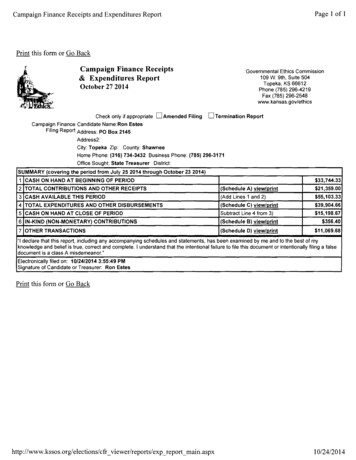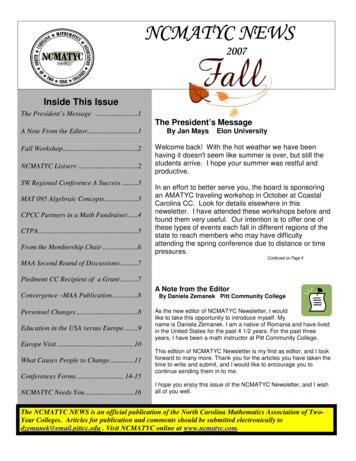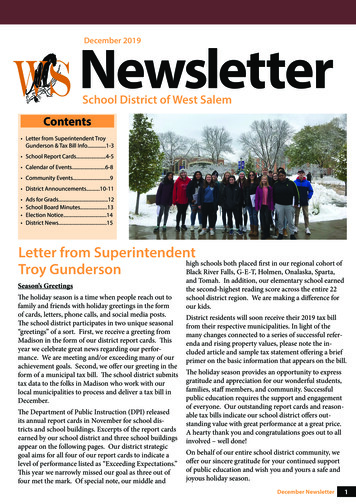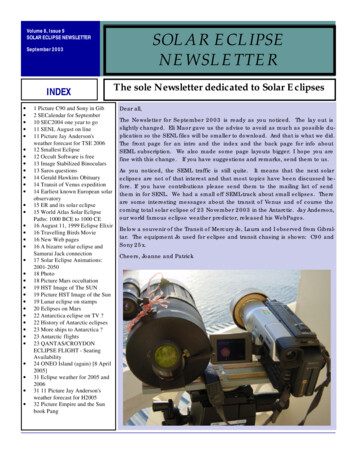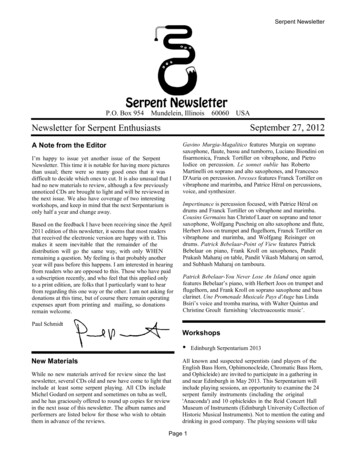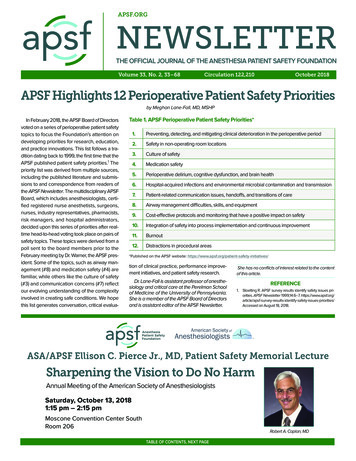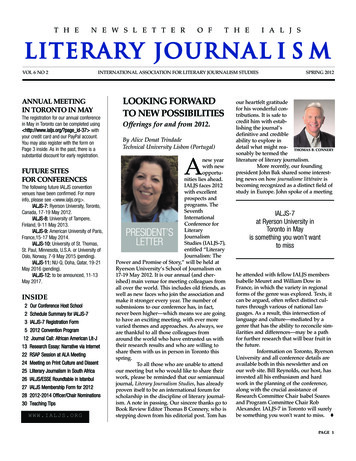
Transcription
T H EN E W S L E T T E RO FT H EI A L J SLiterary jourNA l i s mVOL 6 NO 2INTERNATIONAL ASSOCIATION FOR LITERARY JOURNALISM STUDIESANNUAL MEETINGIN TORONTO IN MAYThe registration for our annual conferencein May in Toronto can be completed using http://www.ialjs.org/?page id-37 withyour credit card and our PayPal account.You may also register with the form onPage 3 inside. As in the past, there is asubstantial discount for early registration.FUTURE SITESFOR CONFERENCESThe following future IALJS conventionvenues have been confirmed. For moreinfo, please see www.ialjs.org .IALJS-7: Ryerson University, Toronto,Canada, 17-19 May 2012.IALJS-8: University of Tampere,Finland, 9-11 May 2013.IALJS-9: American University of Paris,France,15-17 May 2014.IALJS-10: University of St. Thomas,St. Paul, Minnesota, U.S.A. or University ofOslo, Norway, 7-9 May 2015 (pending).IALJS-11: NU-Q, Doha, Qatar, 19-21May 2016 (pending).IALJS-12: to be announced, 11-13May 2017.INSIDE2 Our Conference Host School2 Schedule Summary for IALJS-73 IALJS-7 Registration Form5 2012 Convention Program12 Journal Call: African American Lit-J13 Research Essay: Narrative via Internet22 RSAP Session at ALA Meeting24 Meeting on Print Culture and Dissent25 LIiterary Journalism in South Africa26 IALJS/ESSE Roundtable in Istanbul27 IALJS Membership Form for 201228 2012-2014 Officer/Chair Nominations30 Teaching TipsWWW.IALJS.ORGLOOKING FORWARDTO NEW POSSIBILITIESOfferings for and from 2012.ABy Alice Donat TrindadeTechnical University Lisbon (Portugal)new yearwith newopportunities lies ahead.IALJS faces 2012with excellentprospects andprograms. TheSeventhInternationalConference forLiteraryJournalismStudies (IALJS-7),entitled “LiteraryJournalism: ThePower and Promise of Story,” will be held atRyerson University’s School of Journalism on17-19 May 2012. It is our annual (and cherished) main venue for meeting colleagues fromall over the world. This includes old friends, aswell as new faces who join the association andmake it stronger every year. The number ofsubmissions to our conference has, in fact,never been higher—which means we are goingto have an exciting meeting, with ever morevaried themes and approaches. As always, weare thankful to all those colleagues fromaround the world who have entrusted us withtheir research results and who are willing toshare them with us in person in Toronto thisspring.To all those who are unable to attendour meeting but who would like to share theirwork, please be reminded that our semiannualjournal, Literary Journalism Studies, has alreadyproven itself to be an international forum forscholarship in the discipline of literary journalism. A note in passing. Our sincere thanks go toBook Review Editor Thomas B Connery, who isstepping down from his editorial post. Tom hasPRESIDENT’SLETTERSPRING 2012our heartfelt gratitudefor his wonderful contributions. It is safe tocredit him with establishing the journal’sdefinitive and credibleability to explore indetail what might rea- THOMAS B. CONNERYsonably be termed theliterature of literary journalism.More recently, our foundingpresident John Bak shared some interesting news on how journalisme littéraire isbecoming recognized as a distinct field ofstudy in Europe. John spoke of a meetingIALJS-7at Ryerson University inToronto in Mayis something you won’t wantto misshe attended with fellow IALJS membersIsabelle Meuret and William Dow inFrance, in which the variety in regionalforms of the genre was explored. Texts, itcan be argued, often reflect distinct cultures through various of national languages. As a result, this intersection oflanguage and culture—mediated by agenre that has the ability to reconcile similarities and differences—may be a pathfor further research that will bear fruit inthe future.Information on Toronto, RyersonUniversity and all conference details areavailable both in this newsletter and onour web site. Bill Reynolds, our host, hasinvested all his enthusiasm and hardwork in the planning of the conference,along with the crucial assistance ofResearch Committee Chair Isabel Soaresand Program Committee Chair RobAlexander. IALJS-7 in Toronto will surelybe something you won't want to miss. PAGE 1
T H EN E W S L E T T E RO FT H EI A L J SIALJS-7 AT THE RYERSON SCHOOL OF JOURNALISMTRich in history, our conference host is one of Canada’s premier journalism schools.Adapted from “History” at http://www.ryerson.ca/journalism/abouthe RyersonSchool ofJournalismhad its originsnearly 50 yearsago when students enrolled in the university’s PrintingManagement received a few lectures in“practical journalism.” Those lecturesevolved into a full-fledged journalismprogram in 1950, but until 1959, journalism students shared a common first yearwith Printing Management students. Inaddition to courses like English, economics, practical journalism and publicity,they learned to set type by hand, makelithographic plates and run a small press.Today Ryerson University's journalism school is the second largest in thecountry, with more than 500 studentsenrolled in the program. With its combination of liberal arts and practical experience, modern facilities and instructorswho are working journalists and editors,the school has graduated many successfuljournalists, as well as others who havegone onto successful careers in publicrelations, politics, law enforcement and,recently, web design.There’s always been a strong tradition of journalism at Ryerson. SecondWorld War veterans launched the school’sfirst newspaper, Trit Trot, in 1946, evenbefore the institute itself was official. In1966 The Ryersonian became the lab projectfor graduating-year journalism students.The first home of the School ofJournalism was a Quonset hut at the present site of Egerton Ryerson’s statue onGould Street. The school had seven otherlocations, including the Eaton’s warehouse, where the Eaton Centre nowstands, and the former Chancery office forthe Roman Catholic Archdiocese ofWELCOME,IALJSMEMBERSLITERARY JOURNALISMSPRING 2012 Vol. 6 No. 2Editors: Bill Reynolds and David AbrahamsonISSN 1941-1030 (print)ISSN 1941-1049 (online) 2012 The Newsletter of the International Associationfor Literary Journalism Studies. All rights reserved.PAGE 2Toronto at 55 Gould Street.steadily increased since the class of twoThe School of Journalism foundgraduated in 1952. In the late 1990sa permanent home in 1992 in the 25 milalmost 1,300 people applied for the 150lion Rogers Communications Centre. Thisspots in the undergraduate program andmodern facility houses working newsover 200 applied for the 60 spots in therooms with modern newspaper, magagraduate program. Today the school iszine and broadcast labs. By contrast,home to 550 undergraduate students andwhen the first video display terminal at a54 graduate students.journalism school in Canada wasWelcome to “The Rye,” and weinstalled at Ryerson in 1973, the school’shope you will enjoy IALJS-7! 300 journalism students had to taketurns on the singlemachine.IALJS-7 CONFERENCE SCHEDULE SUMMARYThe School ofJournalism hasWednesday, 16 May 2012undergone manychanges since itsSession 0 16.00 – 18.00 Executive Committee Meetingfounding. In 1971,Ryerson wasThursday, 17 May 2012granted the powerto confer degreesin applied arts.Sign in8.00 – 9.00 Pick up conference materialsThe curriculum ofSession 1 9.00 – 9.15 Welcome and Introductionthe undergraduateSession 2 9.15 – 10.45 Work-in-Progress Session Iprogram hasSession 3 11.00 – 12.00 Keynote Speechgrown from threeLunch12.00 – 13.15years to four, andSession413.15– 14.45 Research Paper Session Iin 1973 a one-yearSession515.00– 16.30 Work-in-Progress Sessions II and IIIgraduate programSession616.45– 18.15 Panel I (Conference Host’s Panel) and Panel IIwas created forSession 7 18.30 – 20.00 Conference Receptionstudents whoalready held university degrees; itFriday, 18 May 2012was expanded totwo years in 1980.Session 8 7.30 – 8.30 Breakfast for Your Thoughts (per reservation)Streaming wasSession 9 9.00 – 10.30 Work-in-Progress Session IV and Panel IIIintroduced in 1983,Session 10 10.45 – 12.15 Panels IV (President’s Panel) and Panel Vand students startLunch12.15 – 13.30ing at the schoolSession1112.15– 13.30 Working Lunch: LJS Staff Meetingthat autumn wereSession1213.30– 15.00 Research Paper Session IIthe first to specialSession1315.15– 16.45 Work-in-Progress Session Vize in print, broadSession 14 17.00 – 18.00 President’s Address & Annual Business Mtgcast or magazineSession 15 19.00 – 21.00 Conference Banquet (per reservation)skills. And in 1993,Ryerson was thefirst polytechnicSaturday, 19 May 2012Canada to becomea university.Session 16 9.00 – 10.30 Work-in-Progress Session VIDemand forSession 17 10.45 – 12.15 Panels VI and VIIadmission into theSession 18 12.30 – 13.00 Closing ConvocationSchool ofJournalism hasLITERARY JOURNALISM / SPRING 2012
T H EN E W S L E T T E RO FT H EI A L J S2012 IALJS CONVENTION REGISTRATION FORM17-19 May 2012Ryerson University School of Journalism, Toronto, Ontario, Canada1.a. PRE-REGISTRATION FEES (MUST BE POSTMARKED ON OR BEFORE 31 MARCH 2012)Please indicatethe applicableamounts:Current IALJS Member – 120(rate for those already having paid their 2012 dues)(rate for those already having paid their 2012 dues)Current IALJS Member retired – 100Student with research paper on program – 30(Includes a one-year IALJS membership)Student without paper on program – 60(Includes a one-year IALJS membership)Non-IALJS member – 170(Includes a one-year IALJS membership)Spouse/Partner – 50 (This fee is required only if a spouse will be attending scheduled research sessions and/or panels)1.b. REGISTRATION FEES POSTMARKED AFTER 31 MARCH 2012(Note: Meals & special events may not be available to those who register after 31 March 2012)Current IALJS Member – 155(rate for those already having paid their 2012 dues)Current IALJS Member retired – 135(rate for those already having paid their 2012 dues)Student with research paper on program – 65(Includes a one-year IALJS membership)Student without paper on program – 95(Includes a one-year IALJS membership)Non-IALJS member – 205(Includes a one-year IALJS membership)Spouse/Partner – 85 (This fee is required only if a spouse will be attending scheduled research sessions and/or panels)1.c. ON-SITE REGISTRATION – 180 for IALJS members, 230 for non-members (includes a one-yearIALJS membership). NOTE: Meals & special events may not be available to those who register on site.2. SPECIAL EVENTS:Please indicate the number of meals required next to each item below"Breakfast for Your Thoughts" (Friday morning)Conference Banquet (Friday evening)Number of meals needed:Number attending x 20*Number attending x 60RegularVegetarian*NOTE: Breakfast on Friday is FREE to students, who, in a collegial IALJS tradition, have a chance to present their work and career goals to the IALJS's faculty members.Make registration checks payable to “IALJS”Please return completed formwith a check or bank transferpayable to “IALJS” to To register on-line via PayPal,see “Conference Payments” atWWW.IALJS.ORGBILL REYNOLDS,IALJS TreasurerSchool of JournalismRyerson University350 Victoria St.,Toronto, Ontario M5B 2K3CANADATel: 01-416-979-5000 x6294Fax: 01-416-979-5216reynolds@ryerson.caTOTAL ENCLOSED:For a reservation at the convention hotel,Hilton Garden Inn, Toronto/City CentreIALJS-7 special reservation web T.mc id POGIALJS room rates – Single/Double: 157.07 CAD (tax incl); Breakfast - 15 CAD/personPhone: 1-877-316-9951 toll-free; 1-416-362-7700 local; 1-416-362-7706 faxE-mail: info@hgitorontocitycentre.com, IALJS Group Code: “IA7”3. REGISTRATION INFOName:Address/DepartmentSchool/UniversityCity, State, Zip, CountryPhoneE-mail AddressName of Spouse (if attending)LITERARY JOURNALISM / SPRING 2012PAGE 3
T H EPAGE 4N E W S L E T T E RO FT H EI A L J SLITERARY JOURNALISM / SPRING 2012
T H EN E W S L E T T E RO FT H EI A L J SInternational Association for Literary Journalism StudiesIALJS-7 CONFERENCE PROGRAM“Literary Journalism: The Power and Promise of Story”The Seventh International Conference for Literary Journalism Studies (IALJS-7)Ryerson UniversitySchool of JournalismToronto, Canada17-19 May 2012Thursday, 17th May 2012Session 18.00 – 8:45Check-in and Registration9.00 – 9:15Introduction and WelcomeBill Reynolds (Ryerson University, Canada)Gerd Hauck, Dean of the Faculty of Communication & Design (Ryerson University,Canada)Alice Donat Trindade (Technical University Lisbon, Portugal)Session 29.15 – 10.45Work-in-Progress Session ISession Title: “Literary Journalism’s Global Reach”(NOTE: Poster/Work-in-Progress Presentations are 10 minutes each)Moderator: David Abrahamson (Northwestern University, U.S.A.)1. Ibrahim Abusharif (Northwestern University in Qatar, Qatar), “The Prospects ofRegional Literary Journalism and the Arab Spring”2. Pablo Calvi (Ithaca College, U.S.A.) and Roberto Herrscher (University of Barcelona,Spain), “Surprising Encounters in Ango-Saxon and Latin American LiteraryJournalism: Cultural, Ethical and Journalistic Cross-Pollination as a Side Product ofthe Wars and Revolutions of the 1970s and 1980s”3. Antonio Castillo (The University of Sydney, Australia), “Literary Journalism in LatinAmerica: Chronic of a Foretold Revival”1LITERARY JOURNALISM / SPRING 2012Continued on next pagePAGE 5
T H EN E W S L E T T E RIALJS-7 PROGRAM Continued from previous pageO FT H EI A L J S4. Pascal Gin (Carleton University, Canada), “Promising Flat Narratives? AssessingSocial Representation in Contemporary French Nonfiction”Q&A – 20 minutes totalSession 311.00 – 12.00 Keynote SpeechIntroduction: Tom B. Connery (University of St. Thomas, U.S.A.)Title: “Firing the Canon: The Historical Search for Literary Journalism's Missing Links”Nancy L. Roberts (University at Albany - SUNY, U.S.A.)Q&A – 20 minutes totalLunch12.00 – 13.15 (on your own)Session 413.15 – 14.45 Research Paper Session ISession Title: “Writing, Speaking, Seeing: The Essence of Literary Journalism”(NOTE: Research Paper Presentations are 15 minutes each)Moderator: Isabelle Meuret (Université Libre de Bruxelles, Belgium),1. Nora Berning (University of Western Ontario, Canada), “Literary Photo-Reportagesand the Ethics of Visual Storytelling: Analysing the Literary Excess of the WorldPress Photo 2011”2. Miles Maguire (University of Wisconsin Oshkosh, U.S.A.), “‘Down Past Joy’: LostLook at Race in the 1960s”3. Stacy Spaulding (Towson University, U.S.A.), “Reality Boundaries: A NarrativeAnalysis of Author Interviews in the Paris Review” WINNER, 2012 IALJSGREENBERG RESEARCH PRIZE FOR LITERARY JOURNALISM STUDIESQ&A – 15 minutes totalSession 5a15.00 – 16.30 Work-in-Progress Session IISession Title: “Literary Journalism: Telling Untold Stories”Moderator: Isabel Soares (Technical University Lisbon, Portugal)1. Kristiane Larssen and Harald Hornmoen (Oslo and Akershus University College ofApplied Sciences, Norway), “The Literary Journalist as Fellow Human Being”2. Isabelle Meuret (Université Libre de Bruxelles, Belgium), “Literary Journalism andthe Legacy of Ethnic Minority Writing”3. Josh Roiland and Allison Schlosser (Case Western Reserve University, U.S.A.), “AFourth Way to Tell the Story: Ethnography in Literary Journalism and Anthropology”4. Lindsay Simpson (James Cook University, Australia), “Diaries and Digitales Documenting the Writer’s Personal Relationship with Ethnographic Research: A Tale2PAGE 6Continued on next pageLITERARY JOURNALISM / SPRING 2012
T H EN E W S L E T T E RIALLJS-7 PROGRAM Continued from previous pageO FT H EI A L J Sof the Crime Writer at Work”Q&A – 20 minutes totalSession 5b15.00 – 16.30 Work-in-Progress Session IIISession Title: “Narrator and Narrative: Giving Voice to Literary Journalism”Moderator: Brian Winston (University of Lincoln, U.K.)1. Hilde van Belle (Lessius University College, Belgium), “The Rhetoric of Nonfiction:Negotiating the Genre”2. Harriet Hustis (The College of New Jersey, U.S.A.), “Hersey, Hiroshima and theManhattan Project Investigating Group: Power, Narrative and the Ethics of PowerfulNarrative”3. Steen Steensen (Oslo and Akershus University College of Applied Sciences,Norway), “The Rise of the Humble ‘I’: How the The Bookseller in Kabul Changedthe Ideals of Narration in Norwegian Book-Length Literary Journalism”4. Marie Vanoost (Université Catholique de Louvain, Belgium), “Literary Journalism asan Attempt to Reconcile the ‘Intriguing’ and ‘Configuring’ Functions of Narrative”Q&A – 20 minutes totalSession 6a16.45 – 18.15 Panel IConference Host's Panel: “The Limit of Invention in Nonfiction”(NOTE: Panel Presentations are 10 minutes each)Introduction: Bill Reynolds (Ryerson University, Canada)Moderator: Ian Brown (author, The Boy in the Moon)Anne Collins (publisher, Random House Canada)Marni Jackson (author, Home Free and Pain: The Fifth Vital Sign)John Macfarlane (editor, The Walrus)Michael Winter (author, The Death of Donna Whalen)Q&A – 20 minutes totalSession 6b16.45 – 18.15 Panel IIPanel Title: “Fact and Feeling: Objectivity in Writing and Teaching Memoir”Moderator: Richard Keeble (University of Lincoln, U.K.),Susan Greenberg ( Roehampton University, U.K.)Amanda Hopkinson (University of Manchester)Sue Joseph ( University of Technology, Sydney, Australia)Ann McFerran ( City University London, U.K.)Julie Wheelwright (City University London, U.K.)3LITERARY JOURNALISM / SPRING 2012Continued on next pagePAGE 7
T H EN E W S L E T T E RIALJS-7 PROGRAM Continued from previous pageO FT H EI A L J SQ&A – 20 minutes totalSession 718.30 – 20.00 Conference Reception (Ryerson School of Journalism, Room TBA)20.00 – ?Informal drinks and Dinner (on your own)Friday, 18th May 2012Session 87.30 – 8.30reservation)Breakfast for Your Thoughts (Hilton Garden Inn, Easton Room, perModerators: Norman Sims (University of Massachusetts - Amherst, U.S.A.), JoshuaRoiland (Case Western Reserve University, U.S.A.) and Tobias Eberwein (TechnischeUniversität Dortmund, Germany)“The Future of Literary Journalism and Literary Journalism Scholarship”Session 9a9.00 – 10.30Work-in-Progress Session IVSession Title: “A Century of Literary Journalism: The Power of Story”(NOTE: Poster/Work-in-Progress Presentations are 10 minutes each)Moderator: Miles Maguire (University of Wisconsin Oshkosh, U.S.A.)1. Richard Keeble (University of Lincoln, U.K.), “Rajiv Chandrasekaran’s Imperial Lifein the Emerald City: The Power and Pitfalls of the Story”2. Roberta Maguire (University of Wisconsin Oshkosh, U.S.A.), “African AmericanLiterary Journalism in the 1950s”3. Marina Remy Abrunhosa (Université of Paris IV-Sorbonne, France), “The Stories ofthe Unnoticed in George Orwell’s The Road to Wigan Pier (1937)”4. Amber Roessner (University of Tennessee, U.S.A.), “‘They’s Nothin’ He Couldn’tDo’: Ring Lardner’s Promotional Literature and the National Pastime’s Heroes of theDead Ball Era”Q&A – 20 minutes totalSession 9b9.00 – 10.30Panel IIIPanel Title: “The New Yorker’s Literary Journalism Traditions in the Modern Age”(NOTE: Panel Presentations are 10 minutes each)Moderator: Kathy Roberts Forde (University of South Carolina, U.S.A.)Tom Connery (University of St. Thomas, U.S.A.)Brian Gabrial (Concordia University, Canada)4PAGE 8Continued on next pageLITERARY JOURNALISM / SPRING 2012
T H EN E W S L E T T E RIALJS-7 PROGRAM Continued from previous pageO FT H EI A L J SJennifer E. Moore (University of Minnesota, U.S.A.)Nancy L. Roberts (University at Albany, U.S.A.)Q&A – 20 minutes totalSession 10a10.45 – 12.15 Panel IVPresident's Panel: “Reading True Stories: Undergraduate Experiences with LiteraryJournalism”Introduction: Alice Donat Trindade (Technical University Lisbon, Portugal)Moderator: Joshua M. Roiland (Case Western Reserve University, U.S.A)Anthony Gatti, Economics & Political Science (Case Western Reserve University,U.S.A.)Alexis Parisi, Chemistry & English (Case Western Reserve University, U.S.A.)Nicholas Rossi, Mechanical Engineering (Case Western Reserve University, U.S.A.)Indira Samuels, Sociology (Case Western Reserve University, U.S.A.)Bryden Spevak, Psycology & English (Case Western Reserve University, U.S.A.)Lisa Viers, English & Philosophy (Case Western Reserve University, U.S.A.)Q&A – 20 minutes totalSession 10b10.45 – 12.15 Panel VPanel Title: “Literary Journalism and the Book: The Virtuous Intersection”Moderator: Rob Alexander (Brock University, Canada)Vera Hanna (Universidade Presbiteriana Mackenzie, Brazil)Sam Riley (Virginia Polytechnic Institute and State University, U.S.A.)Kathy Roberts Forde (University of South Carolina, U.S.A.)Isabel Soares (Technical University Lisbon, Portugal)Q&A – 20 minutes totalLunch12.15 – 13.30 (on your own)Session 1112.15 – 13.30 Working Lunch: Literary Journalism Studies Staff MeetingEditor: John Hartsock (State University of New York, Cortland, U.S.A.)Session 1213.30 – 15.00Research Paper Session IISession Title: “There, Where Literary Journalism May Take Us”5LITERARY JOURNALISM / SPRING 2012Continued on next pagePAGE 9
T H EN E W S L E T T E RIALJS-7 PROGRAM Continued from previous pageO FT H EI A L J SModerator: Norman Sims (University of Massachusetts - Amherst, U.S.A.)1. Jo Bech-Karlsen (Norwegian Business School, Norway), “The Norwegian NonfictionNovel Two Suspicious Characters: Thirty-Three Years Before In Cold Blood”2. Susan Greenberg (University of Roehampton, U.K.), “Reportage in Poland: A CaseStudy”3. Stephen Robert Morse (Erasmus Mundus Scholar), “Contemporary Travel WritingDefined: The Evolution of Travel Journalism and the Travel Narrative fromColonialism to Globalization and Beyond”Q&A – 15 minutes totalSession 1315.15 – 16.45 Work-in-Progress Session VSession Title: “Multiplicity at the Core of Literary Journalism”Moderator: Roberta Maguire (University of Wisconsin Oshkosh, U.S.A.),1. Todd Schack (Ithaca College, U.S.A.), “Writing About Music: A Disappearing SubGenre of Literary Journalism”2. William Dow (Université Paris-Est and American University in Paris, France),Stories of Lived Experience: American Experimental Poetry and Literary Journalism”3. Isabel Nery (Journalist at “Visão”, Portugal), “Literary Journalism and the Power ofReport Essays: War Report Contributions”4. Hana Wirth-Nesher (Tel Aviv University, Israel), “Pronouncing Truths: MultilingualMoments in Life Writing”Q&A – 20 minutes totalSession 1417.00 – 18.00 President’s Address and Annual Business MeetingAlice Donat Trindade (Technical University Lisbon, Portugal)Bill Reynolds (Ryerson University, Canada)Norman Sims (University of Massachusetts - Amherst, U.S.A.)Isabel Soares (Technical University Lisbon, Portugal)David Abrahamson (Northwestern University, U.S.A.)Session 1519.00 – 21.00 Conference Banquet, per reservation (Hilton Garden Inn, MulockRoom)Saturday, 19th May 2012Session 169.00 – 10.30Work-in-Progress Session VISession Title: “Literary Journalism: Fact, Truth, Objectivity, Controversy”Moderator: William Dow (Université Paris-Est and American University in Paris, France)1. Tobias Eberwein (TU Dortmund, Germany), “Controversy as Literary Journalism’sContinued on next page6PAGE 10LITERARY JOURNALISM / SPRING 2012
T H EN E W S L E T T E RIALJS-7 PROGRAM Continued from previous pageO FT H EI A L J SStorytelling in Germany”2. Bruce Gillespie (Wilfrid Laurier University, Canada), “Building Bridges BetweenEthnography and Literary Journalism”3. Kjersti Rustand and Harald Hornmoen (Oslo and Akershus University College ofApplied Sciences, Norway), “The Credibility of True Stories in Literary Journalism”4. John Tulloch (Lincoln University, U.K.), “Journalism, Imagination and the Art ofFact: The Work of Geoffrey Moorhouse”Q&A – 20 minutes totalSession 17a10.45 – 12.15 Panel VIPanel Title: “Literary Journalism and Public Memory”Moderator: Nancy L. Roberts (University at Albany - SUNY, U.S.A.)Paul Ashdown (University of Tennessee, U.S.A.)Pablo Calvi (Ithaca College, U.S.A.)Leonora Flis (University of Nova Gorica, Slovenia)Amber Roessner (University of Tennessee, U.S.A.)Q&A – 20 minutes totalSession 17b10.45 – 12.15 Panel VIIPanel Title: “Engaging Students with Literary Journalism Readings: Words thatWork”Moderator: Susan Greenberg (Roehampton University, U.K.)John Capouya (University of Tampa, U.S.A.)John Hanc (New York Institute of Technology) and Mitzi Lewis (Midwestern StateUniversity, U.S.A.)SuHua Huang (Midwestern State University, U.S.A.)Alice Donat Trindade (Technical University Lisbon, Portugal)Q&A – 20 minutes totalSession 1812.30 – 13.00 Closing ConvocationBill Reynolds (Ryerson University, Canada)7LITERARY JOURNALISM / SPRING 2012PAGE 11
T H EN E W S L E T T E RO FT H EI A L J SCall for Papersfor Special Issue onAfrican AmericanLiterary JournalismLiteraryJournalism Studies, a peer-reviewed journal sponsored by theInternational Association for Literary Journalism Studies (IALJS), invites submissions for a special issue on African American literary journalism of thenineteenth, twentieth and/or twenty-first centuries. Working with a broad definition of literary journalism as fact-based, timely prose that employs literarytechnique (symbolism, dialogue, scene construction, character development,narrative structure, etc.), we are interested in manuscripts of 5,000 to 8,000words that investigate African American-controlled venues hospitable to literary journalism as well as individual writers and their texts. While we welcomescholarship on the literary journalism of academics, poets and fiction writerssuch as W. E. B. Du Bois, Zora Neale Hurston, Langston Hughes, AliceChildress and James Baldwin, we are also seeking manuscripts that focus onwriters who primarily or even exclusively were or are journalists. Please directquestions and send submissions to Roberta S. Maguire maguire@uwosh.edu . The submission deadline for this special issue is 1 June 2012.Published by the International Association for Literary Journalism StudiesPAGE 12LITERARY JOURNALISM / SPRING 2012
T H EN E W S L E T T E RO FT H EI A L J SNARRATIVE JOURNALISM IN THE AGE OF THE INTERNETNew ways to create authenticity in online literary reportages.TBy Nora Berning, University of Western Ontario (Canada)the Internet and its unique electronic features. The text-immahere is no more fiction or nonnent analysis of the two articles is complemented by materialfiction, only narrative.from my interviews with the two writers of narrative nonfiction.—E. L. Doctorow, 1975.Both Delgado-Kling and Bowden are distinguished journalistsThe transcendence of objectivity thatwho have specialized in the field of nonfiction and creative writDoctorow refers to in the realm of liting. My conversations with them bear testimony to the fact thaterature has found its most fecundit is time to revisit and reassess some of Habermas’s ideascounterpart in the profession of jouragainst the background of our fractioned, multifaceted informanalism at a time when journaliststion age.began to experiment with newAt the heart of the works of New Journalists was essenreporting and writing techniques.tially a reflection on broader cultural change. In an attempt toEspecially with the rise of Newreconcile the conflicting worlds of journalism and literature,Journalism in the 1960s and 1970s—aNew Journalists like Norman Mailer, Gay Talese and Tom Wolfecatchall term for a group of journalwere not only concerned with a an accurate and beautiful repreists and writers that relied predomisentation of reality, but they were also dedicated to guidingnantly on literary techniques—theaudiences toward democratic possibilities. Given that Newscholarly debate about the relationship between fact and fiction,Journalists were heavily criticized by tradiobjectivity and subjectivity, reached a newtional media for injecting their own pointdimension.1 Unlike in the creative arts, theof view in an article and thus blurring therelationship in journalism is not primarilyboundaries between fact and fiction, theirdriven by aesthetic demands but is conThe Newwork can be seen as challengingstrained by ethical premises, journalism’sJournalism’s emphasis on theHabermas’s view regarding the dichotomyprofessional ideology and not least bybetween ethics and aesthetics. Rather thanfinancial concerns.2subtleties ofdrawing a demarcation line between priBehind the journalistic principlelanguage stands in stark contrastvate and public self, New Journalistsof “cultural meaning making” lurks theto Habermasdemonstrate that such boundaries need torationale that media’s underlying commube seen as fluid, permeable and alwaysnication infrastructure should ideally funccontested. Their aesthetic convictions, intion as a democratic public sphere thatBakhtinian terms,5 take shape in the formturns specific current events into topics ofof an intertext, that is, a sort of “intertextubroader societal concern.3 In his masteral” web of cultural meaning production that calls on the audinarrative, The Structural Transformation of the Public Sphere,ence to reflect on social reality and media production. FollowingJürgen Habermas circumscribes the public sphere as a discurBakhtin, online literary reportages represent cultural texts andsive space for reasoned communicative exchange that is basedpractices which are, by nature, intertextual and dialogical insofaron informed and rational argument.4 His work has receivedas “any utterance is a link in a very complexly organized chainvociferous criticism, because the author rigorously sidelines aesof other utterances” with which “it enters into one kind of relathetic and affective modes of communication. Moreover,tion or another.”6 While New Journalists’ emphases on the subHabermas delineates sharply between particular forms of distleties of language, creativity and a focus on writing practicescourse: A bifurcation between public and private, state and pubstand in stark contrast to the Habermasian evaluation of popul
Journalism was a Quonset hut at the pre-sent site of Egerton Ryerson's statue on Gould Street. The school had seven other locations, including the Eaton's ware-house, where the Eaton Centre now stands, and the former Chancery office for the Roman Catholic Archdiocese of THE NEWSLETTER OF THE IALJS PAGE 2 LITERARY JOURNALISM / SPRING 2012


